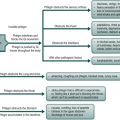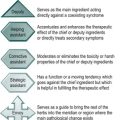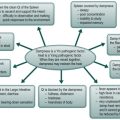5. Syndrome of Heart-blood deficiency
Manifestations
Main symptoms
Pale complexion, pale lips, dizziness, palpitations, anxiety and shortness of breath.
Secondary symptoms
Tingling of limbs and extremities, poor memory, inability to concentrate, tiredness, insomnia and poor appetite.
Tongue
Cracked, pale or delicate pink, with a white coating.
Pulse
Thready and weak.
Associated disorders in western medicine
Blood loss, weak constitution and chronic diseases, various anemias, malnutrition, hypotension, after a surgical operation or delivery of a baby.
Analysis of the syndrome
• The Heart governs the blood and promotes the blood circulation. If the blood is deficient, it is unable to support the body, and a pale complexion, pale lips and pale tongue may present.
• When the blood is unable to house the Heart-shen, palpitations, anxiety, restless sleep, poor memory, inability to concentrate and insomnia may exist.
• If the Heart-blood is unable to support the Qi in the head and chest, dizziness, headache and shortness of breath may occur.
• When the blood is too weak to circulate, to nourish the body and to carry the Qi, tiredness, poor appetite and tingling of the limbs appear.
• The signs of the tongue and the pulse clearly show the deficiency of the blood.
Treatment principle: Tonify the blood and regulate blood circulation
Herb selection principles and formula composition strategies
• First, herbs that enter the Heart, Spleen and Liver meridians, and can directly tonify the Heart-blood are selected.
• Second, herbs that enter the Spleen and Heart meridians, and tonify the Spleen-Qi so as to support the Heart-Qi and generate the Heart-blood are selected, along with herbs that nourish the blood and calm the mind.
• Third, herbs that stimulate the Qi and blood, and remove phlegm obstruction in the Heart meridian are selected.
Structure of the formula and selection of herbs
Chief: Tonify the Heart-blood
Dang Gui ( Angelicae sinensis radix) and Bai Shao Yao ( Paeoniae radix lactiflora)
Dang Gui is sweet, pungent and warm, and enters the Liver, Heart and Spleen meridians. It is a very commonly used herb to tonify the blood. The strong point of this herb is that it not only tonifies the blood, but also promotes the blood circulation as it has pungent and warm properties. It matches the nature of blood, which prefers warmth and must always be moving. Although it is the first choice for tonifying the Liver-blood, it can tonify the blood of the Spleen and Heart as well. This herb is used mainly in pathological conditions where the Liver-Qi and blood stagnate and disturb the transportation and transformation functions of the Spleen. When the Spleen fails to generate Qi and blood, both the Liver-blood and Heart-blood become weak, resulting in the further stagnation of Qi and blood.
Bai Shao Yao is bitter, sour and slightly cold, and enters the Liver and Spleen meridians. It particularly tonifies the substantial part of the blood and increases the Yin. It is often used in the syndrome of blood and Yin deficiency that manifests as palpitations, restlessness, stiffness and cramping pain of the limbs, dry eyes, blurred vision and scanty menstruation due to deficiency of the blood and Yin of the Heart and Liver.
Long Yan Rou ( Longanae arillus) and Da Zao ( Jujubae fructus)
These are two sweet fruits. Long Yan Rou is neutral and Da Zao is warm. Both enter the Heart and Spleen meridians. They can gently tonify the Spleen-Qi, nourish the Heart-blood and calm the mind. As they taste nice and have few side effects, they are often selected in formulas or added to the diet for long-term use in a mild case or a chronic condition of Heart-blood deficiency, such as after a surgical operation or in chronic diseases. They are also used in the formula or diet to prevent Heart-blood deficiency in people who are under persistent mental stress.
Deputy: Tonify the Spleen-Qi and calm the Mind
Zhi Gan Cao ( Glycyrrhizae radix preparata) and Long Yan Rou ( Longanae arillus)
Zhi Gan Cao is sweet and slightly warm, and enters all the regular meridians. It is selected in the formula to tonify the Heart-blood because it can tonify the Spleen-Qi and therefore generate the blood. It can also tonify the Heart-Qi, moderate the speed of Qi movement and blood circulation, and harmonize the function of the Heart. The function of Zhi Gan Cao can enhance the ability of the herbs that tonify the Heart-blood. At the same time, this herb can effectively relieve anxiety, palpitations and restlessness.
Long Yan Rou is sweet and neutral, and enters the Heart and Spleen meridians. It can gently tonify the Spleen-Qi, Heart-Qi and the blood. At the same time, it can calm the mind and treat restlessness, anxiety and insomnia. As this sweet fruit has neither cloying nor drying properties, it is often used in a formula for a chronic condition or in the diet for long-term use.
Fu Shen ( Poriae cocos pararadicis)
Fu Shen is neutral and bland, and enters the Heart and Spleen meridians. Since it is able to tonify the Heart-Qi and Spleen-Qi and calm the mind, it is often selected in the formula to enhance the ability of herbs that tonify the blood. At the same time, it can treat restlessness and insomnia. Since it is gentle in action and property, and has almost no taste, it is often used in formulas or in the diet for chronic conditions of deficiency of Heart-Qi and blood.
Suan Zao Ren ( Ziziphi spinosae semen) and Bai Zi Ren ( Platycladi semen)
Suan Zao Ren and Bai Zi Ren are often used in the formula to tonify the blood because they are able to calm the mind and improve sleep.
Suan Zao Ren is sweet and sour. It enters the Liver meridian primarily and the Heart meridian secondly. It can tonify the Liver and Heart blood, stabilize the blood and the Qi and is effective for treating restlessness and irritability, restless sleep, dream-disturbed sleep and nightmares. The strong point of this herb is that it can tonify the blood and calm the mind; therefore it is often used in the formula for tonifying the blood.
Bai Zi Ren enters the Heart meridian primarily and the Liver meridian secondly. It is sweet and has a moistening nature. It is an excellent herb to nourish the Heart-blood and calm the mind. It can also stop sweating and is suitable for treating difficulty in falling asleep, restlessness and palpitations, and becoming nervous easily.
Since mental state and sleep are related with the Heart and Liver, Suan Zao Ren and Bai Zhi Ren are often used together in formulas to calm the mind and improve sleep.
Assistant: Spread the Yang, stimulate the Qi movement in the chest, eliminate phlegm so as to open the Heart meridian and strengthen the Middle-Jiao
Gui Zhi ( Cinnamomi cassiae ramulus)
Gui Zhi is sweet, pungent and warm, and enters the Heart meridian. Since the twigs enter the meridians according to the concepts of traditional Chinese medicine, this herb is able to stimulate the Yang and the Qi of the Heart. Together with herbs that tonify the blood, it can accelerate the speed of the blood-generating process. It is mainly used as assistant in the formula to tonify the blood so as to warm the blood, promote blood circulation and open up the obstruction. It is particularly selected in the syndrome where there is numbness and tingling of the limbs, cold and pain of the extremities.
Chuan Xiong ( Chuanxiong rhizoma)
Chuan Xiong is pungent, bitter and warm, and enters the Liver, Gall Bladder and Pericardium meridians. As its moving speed and strength are high, it is called the herb that moves the Qi in the blood. As assistant in the formula that tonifies the Heart-blood, a small amount of Chuan Xiong may reduce the stagnation of blood due to deficiency. It can also effectively relieve chest pain, stiffness, and tingling and numbness of the limbs.
Yuan Zhi ( Polygalae radix) and Shi Chang Pu ( Acori graminei rhizoma)
These two herbs are pungent, bitter and warm. Yuan Zhi enters the Heart, Kidney and Lung meridians, and Shi Chang Pu enters the Heart and Stomach meridians. They are particularly selected in the formula as assistants because they are able to remove the phlegm from the Heart meridian and treat dizziness, tinnitus, palpitations, anxiety disorientation, poor concentration and memory due to phlegm obstruction of the Heart orifice. This condition may present when the Spleen-Qi is too weak to transport and transform dampness, food and phlegm.
Sheng Jiang ( Zingiberis rhizoma recens) and Da Zao ( Jujubae fructus)
Sheng Jiang and Da Zao are often used together as assistants in the formula because the pungent and warm Sheng Jiang can warm the Stomach and soothe Stomach-Qi, and the sweet and warm Da Zao can tonify the Qi and blood of the Spleen. They promote digestion and strengthen the Middle-Jiao. In this way they broaden the source of the Qi and blood in a general sense.
Envoy: Harmonize the action of herbs in the formula
Zhi Gan Cao ( Glycyrrhizae radix preparata)
Since Zhi Gan Cao enters all the regular meridians and is able to tonify the Qi and moderate the speed and natures of different herbs, it is often used as envoy in the formula.
Common accompanying symptoms and treatment
• Palpitations with a deep red tongue and a wiry and rapid pulse: add Dan Shen ( Salviae miltiorrhizae radix) to cool the Heart blood and calm the mind.
• Palpitations and anxiety with a red tongue with a dry coating: add Sheng Di Huang ( Rehmanniae radix) and Mai Men Dong ( Ophiopogonis radix) to nourish the Yin.
• Shortness of breath and tiredness: add Dang Shen ( Codonopsis radix) and Wu Wei Zi ( Schisandrae fructus) to tonify and stabilize the Heart-Qi.
Examples of classical formulas
Gui Pi Tang (Restore the Spleen Decoction) 
Source: Ji Sheng Fang 
Composition
Ren Shen ( Ginseng radix) 15 g
Huang Qi ( Astragali radix) 30 g
Bai Zhu ( Atractylodis macrocephalae rhizoma) 30 g
Zhi Gan Cao ( Glycyrrhizae radix preparata) 8 g
Fu Shen ( Poriae cocos pararadicis) 30 g
Suan Zao Ren ( Ziziphi spinosae semen) 30 g
Long Yan Rou ( Longanae arillus) 30 g
Dang Gui ( Angelicae sinensis radix) 3 g †
Yuan Zhi ( Polygalae radix) 3 g †
Mu Xiang ( Aucklandiae radix)** 15 g
Sheng Jiang ( Zingiberis rhizoma recens) 6 g
Da Zao ( Jujubae fructus) 3–5 pieces
Analysis of the formula
This is a formula to treat chronic Spleen-Qi deficiency, which is unable to generate the Qi and blood to support the Heart. It results in deficiency of the Heart-Qi and blood. The main manifestations are palpitations, anxiety, forgetfulness, insomnia, feverishness and night sweats, prolonged menstruation with pale blood, poor appetite and tiredness, a wan complexion, a pale tongue with a thin white coating and a weak pulse.
In this formula:
• The chief can be considered as a group of herbs, a variation of Si Jun Zi Tang (Four-Gentlemen Decoction), the principal formula for tonifying the Spleen-Qi. They are Ren Shen, Huang Qi, Bai Zhu and Zhi Gan Cao. These herbs can directly tonify the Spleen-Qi, strengthen the foundation of life and accelerate the process of generating the Qi and blood.
• Fu Shen, Long Yan Rou and Suan Zao Ren serve as deputies. They are particularly used to calm the mind and improve sleep. Fu Shen and Long Yan Rou can tonify the Heart-Qi and Long Yan Rou and Suan Zao Ren can effectively nourish the Heart-blood.
• Dang Gui, Suan Zao Ren, Long Yan Rou and Da Zao form another group of deputy herbs that particularly tonify the blood of the Heart and house the Heart-shen.
• Mu Xiang and Yuan Zhi serve as assistants: the former can regulate the Qi movement in the Middle-Jiao to negate the sweet and cloying nature of the tonifying herbs that may obstruct the Qi movement and bring an extra burden to the Stomach; the latter can remove the invisible phlegm and connect the Heart with the Kidney, thereby calming the mind.
• Sheng Jiang and Da Zao serve as both assistant and envoy. They can harmonize the Middle-Jiao and promote digestion so as to strengthen the tonifying function of the chief herbs.
Commentary on strategies
This is a well-organized formula for treating a chronic deficiency condition. It concerns the relationship of the physiological and pathological aspects between the Spleen, Heart and Kidney, as well as the Qi and blood of the Heart and Spleen. It balances the composition and dosage to achieve the optimal result of tonifying the Heart-Qi and blood in order to improve all the symptoms in this syndrome.




